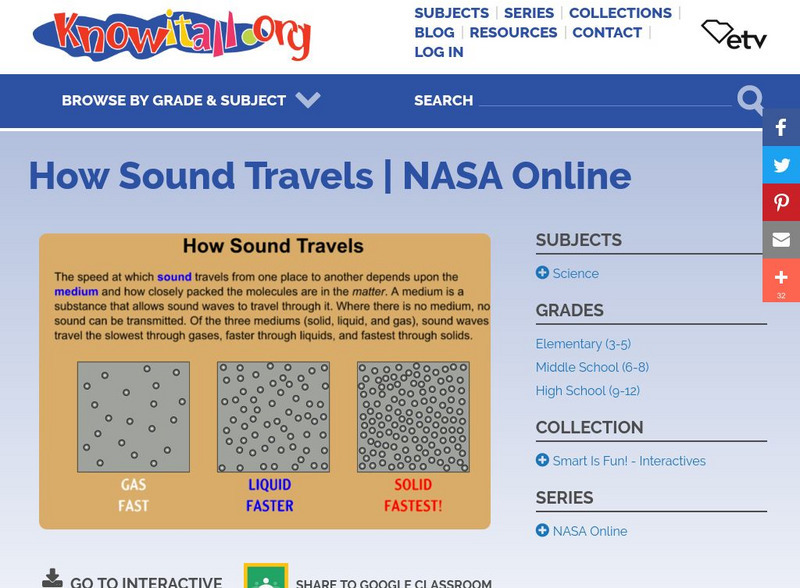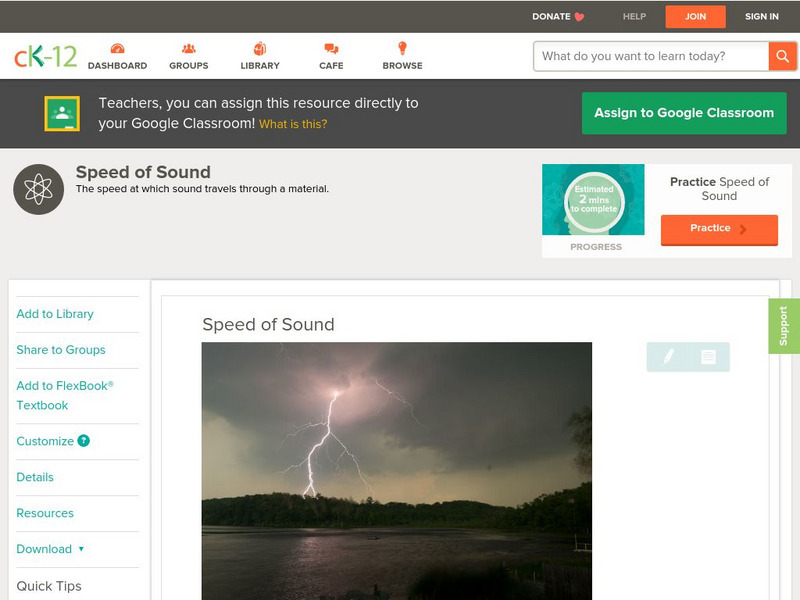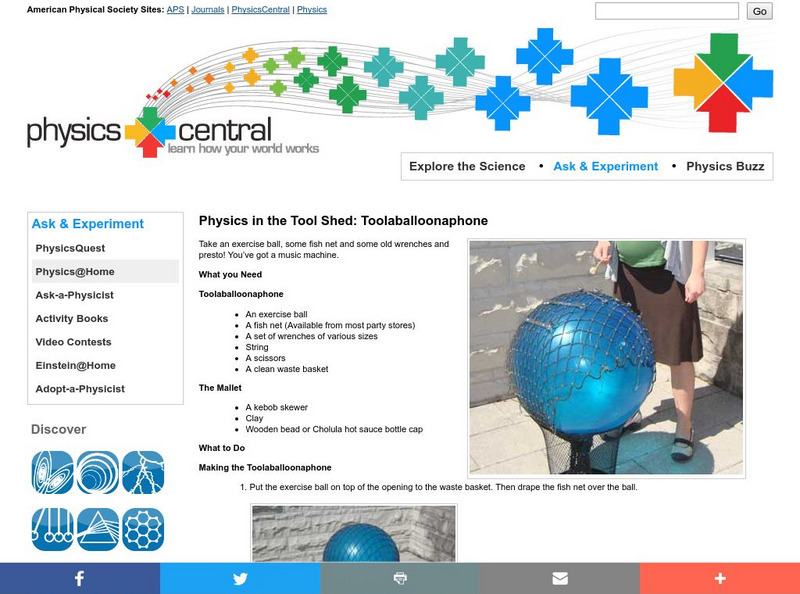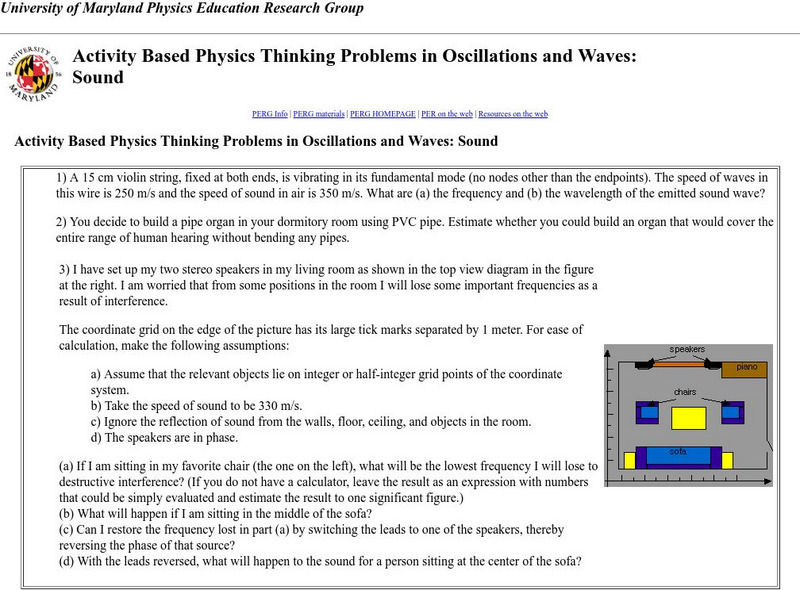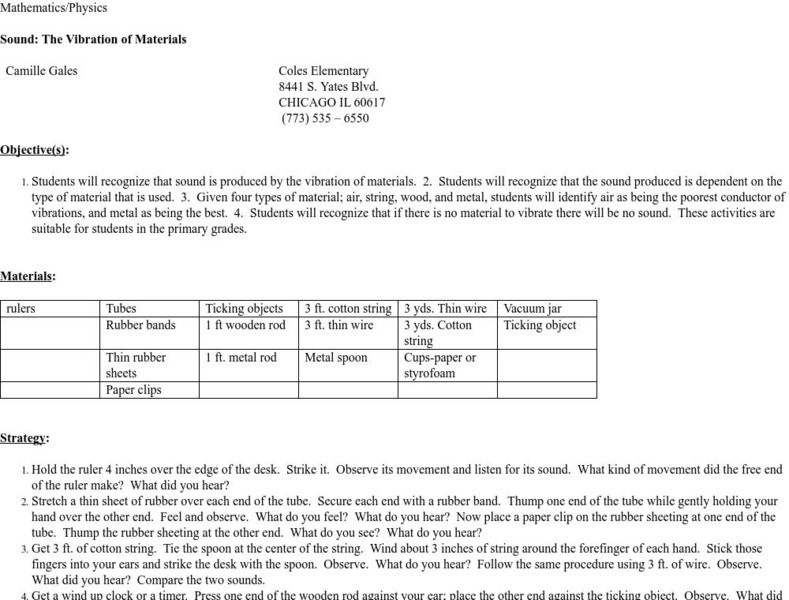Discovery Education
Discovery Education: The Phenomenon of Sound Waves
A lab activity on sound waves is presented on this website. Learners will learn about sound waves produced by different objects in this activity. There are also a set of discussion questions and two other variations of the lab exercise.
Physics Classroom
The Physics Classroom: Waves: Waves and Wavelike Motion
Here is an introduction to the concept of waves and wavelike motion people experience anywhere and everywhere.
Physics Classroom
The Physics Classroom: Echo vs. Reverberation
Learn the difference between an echo and a reverberation on this reference page. Page includes an animation to show the difference.
South Carolina Educational Television
Etv: Nasa Online: Sound: How Sound Travels
An animation explaining how sound travels and demonstrating how sound transmission is affected by environment.
Physics Aviary
Physics Aviary: Beats Lab
This lab is designed to help students visualize the formation of beats and the relationship between the number of beats per second and the beat frequency heard by the observer.
Physics Aviary
Physics Aviary: Doppler Lab
This lab is designed to have students investigate the changes to wavelength and frequency that occur when the source of the waves is in motion. This video describes the lab: https://youtu.be/eCceYPBR6f4
Physics Aviary
Physics Aviary: Resonance Tube Lab
This lab is designed to help students visualize the formation of standing waves in a wind instrument. Students will be able to view fundamental waves as well as some higher harmonics. They can work with a tube with two open ends or just...
CK-12 Foundation
Ck 12: Physical Science: Speed of Sound
[Free Registration/Login may be required to access all resource tools.] What the speed of sound is and its variation in different media, and the effect of temperature on the speed of sound.
OpenSciEd
Open Sci Ed: Hitting the High Notes: Pitch
A simulation that shows what happens to a sound wave when the pitch is changed.
OpenSciEd
Open Sci Ed: Turn It Up!: Loudness
A simulation that shows what happens to a sound wave when the pitch is changed.
BBC
Bbc: Gcse Bitesize: Why Do Scientists Think That Light and Sound Are Waves?
Light travels as transverse waves and can travel through a vacuum. Sound travels as longitudinal waves and needs to travel through a solid, liquid or gas. Read about the properties of light and of sound, and learn the differences between...
Khan Academy
Khan Academy: Doppler Effect Review
Review key terms and skills for the Doppler effect, including how to interpret wavefront diagrams.
Physics Central
Physics Central: Physics in the Tool Shed: Toolaballoonaphone
Learn about compression waves and amplification through constructing a toolaballoonaphone! The toolaballoonaphone is made out an exercise ball, fish nets, wrenches, strings, scissors, and a clean waste basket that allows students to...
University of Maryland
University of Maryland: Thinking Problems With Sound
A series of thought-provoking multiple-choice questions from the University of Maryland on the topic of sound and acoustics. One question pertains to the acoustics of a furnished room with two speakers; demands a basic understanding of...
Science and Mathematics Initiative for Learning Enhancement (SMILE)
Smile: Ears and Hearing
This lesson plan investigates sound waves and how the ear hears. Young scholars create a model of the ear using a cardboard tube, plastic wrap, and a sheet of paper.
Science and Mathematics Initiative for Learning Enhancement (SMILE)
Smile: Sound, Pitch, and Conduction
Lesson for primary elementary about sound. Learners learn about pitch, air conduction, and bone conduction.
Science and Mathematics Initiative for Learning Enhancement (SMILE)
Smile: Sound
This site provides a lesson plan designed for primary pupils over a three week period. Students learn concepts of vibration, communication,and pitch.
Science and Mathematics Initiative for Learning Enhancement (SMILE)
Smile: Sound (Primary)
This site provides two activities that can be used in the primary elementary classroom. The purpose is to "demonstrate different ways to produce sound."
Science and Mathematics Initiative for Learning Enhancement (SMILE)
Smile: Sound, the Vibration of Materials
Great activity for primary and intermediate students to learn why objects make noise. This can be organized in stations or in groups of students.
Wikimedia
Wikipedia: Ultrasound
Wikipedia offers information on the basics of ultrasound, "Sound or vibrations with frequencies too high to be audible by the human ear."
Other
Avatar Consultants, Inc: Definition of Intensity
Power, loudness, and decibel levels of sound waves are described and explained. The relative power output of various musical instruments is given.
Other
Physics of Sound/image Analysis of Sound Pressure
A discussion on how to locate the sound image based upon the incident and reflected pulse of sound heard at a given location. For those looking for a challenge, follow the links to view derivations of wave equations for sound (uses...
The Franklin Institute
Franklin Institute: Sound Lessons by Fifth Graders
Resource provides five easy-to-follow lessons that you can do with your class to teach the science of sound.
Sophia Learning
Sophia: Doppler Effect: Lesson 2
This lesson will describe how the doppler effect is created by moving sound waves. It is 2 of 4 in the series titled "Doppler Effect."




